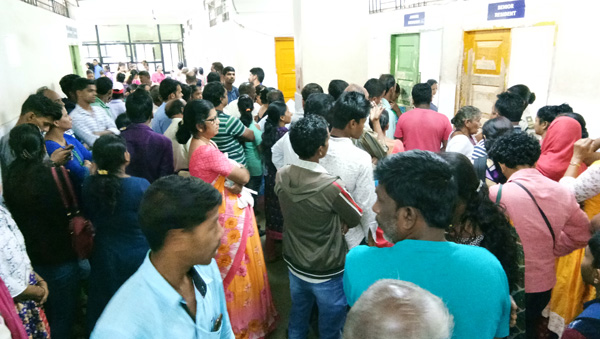10 Dec 2017 | 05:58am IST
Who will bell the cat?
Of late the private hospitals are in the eye of the storm in wake of several cases of overcharging and false bills. SURAJ NANDREKAR digs into the issue and finds out what the law mandates
irst case, a veteran advocate, well known in the social circle, is admitted in a private hospital in the city for chronic illness.
As always, the private hospital exhausts the limit on his health card and refuses to give further treatment of two crucial injections unless advance payment is made.
The family of the lawyer has to plead with Health Minister Vishwajit Rane for shifting the patient to the Goa Medical Hospital and the minister acts immediately and transfers him.
But unfortunately, the patient breathes his last at GMC as crucial treatment isn’t given to him on time.
Second case, a Canacona resident is shifted to another city based hospital for cardiac arrest.
Hospital conducts angiography, angioplasty and other treatment and the Rs 3.5 lakh limit of DDSSY card is exhausted.
Despite the treatment, the patient dies after two days. The so called private hospital refuses to hand over the body unless the additional amount of Rs 3.5 lakh is paid in full.
Case 3: An old lady is admitted to a private hospital and undergoes treatment for 15 days and exhausts her DDSSY limit.
Even after the patient recovers she isn’t given discharge as her relatives have not paid the additional amount.
Of late the private hospitals are in news for overcharging throughout the country, be it in Goa, Delhi or Mumbai.
Charging exorbitant fees for medical services by a section of private healthcare institutions has been a matter of sharp criticism, the above given cases are just a few examples of how things work in a private hospitals.
While the State government in a bid to reduce pressure on the State-run Goa Medical College Hospital and provide quality healthcare to the citizens it has introduced the Din Dayal Swasthya Seva Yojana (DDSSY) Scheme but the hospital sharks seem to be just on the prowl for patients.
The DDSSY gives an insurance cover of Rs 3.5 lakh to Rs 4.5 lakh depending on family structure and the patients can opt for treatment in any empanelled private hospital.
Following this, the patients move to the best healthcare facilities but to their bad luck the private hospitals seem to be taking undue advantage of this.
The public medical institutions are overburdened with a huge number of patients with respect to their manpower and physical infrastructure.
A large number of patients opt for private medical institutions and most of them become penniless by paying illogically high service costs.
The government has little control over the quality of services and the amount private hospitals and clinics charge for the treatment. No standard charges have been fixed and also no ceiling of service charges is mentioned. In this situation, patients are left at the whims and mercy of a section of private healthcare providers who are mostly driven by profit motives, rather than serving the ailing mankind.
The underprivileged and poor people, that constitute a large segment of the population, remain widely excluded from the healthcare services in the private sector due to the high cost.
And unfortunately, the National Health Policy insufficiently delineates obligatory roles of the private healthcare institutions in the country’s health sector.
“The cost of healthcare services also wary widely among the private institutions. They charge high fees for diagnostic services which also vary from institution to institution,” says Siddesh Desai from Margao.
Mario Almeida of Sangolda says, “I had opted for treatment of my wife in a private hospital and believe me I was left penniless at the end. And after all this she did not even survive.”
What the CLINICAL ESTABLISHMENT ACT says?
There is a law to look into all this but many do not even know it exists.
The Clinical Establishments Act was enacted by the Centre to provide for registration and regulation of all clinical establishments in the country with a view to prescribe the minimum standards of facilities and services provided by them.
The Act is applicable to all types (both therapeutic and diagnostic types) of clinical establishments in the public and private sectors.
Till now five states, including Arunachal Pradesh, Rajasthan, Jharkhand and Assam and all Union Territories except the NCT of Delhi, have adopted and implemented the Act. States like Sikkim, Mizoram, Bihar, UP and Uttarakhand have adopted the Act but are yet to implement it.
Under the Act, standard treatment guidelines are specified for 227 diseases, including dengue, chikungunya and malaria. The hospitals are supposed to abide by minimum standards in terms of infrastructure, services, staff, equipments and lighting arrangements among others.
A technical committee is to be set up to decide on charges for treatment of diseases and procedures at clinical establishments, including private hospitals.
Health facilities are supposed to display the charges for each procedure and facility to keep the patient informed in advance. Failure to adhere to these guidelines would result in imposition of penalty.

